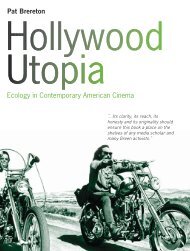Schirmer Encyclopedia of Film
Schirmer Encyclopedia of Film
Schirmer Encyclopedia of Film
Create successful ePaper yourself
Turn your PDF publications into a flip-book with our unique Google optimized e-Paper software.
dictatorship; Gringuito (Sergio Castilla, 1998) explores<br />
the strangeness <strong>of</strong> return through the eyes <strong>of</strong> a young<br />
boy; Alarcón’s Tsikatriz (The Scar, 1996) follows the<br />
story <strong>of</strong> two brothers who struggle to overcome their<br />
ideological discrepancies after one <strong>of</strong> them returns from<br />
Moscow.<br />
Following his return to Chile, Guzmán wished to<br />
confront the fact that, during the first years <strong>of</strong> the transition<br />
to democracy, the government had encouraged a<br />
policy <strong>of</strong> forgetting rather than addressing the violence <strong>of</strong><br />
the dictatorship. His documentary Chile, la memoria<br />
obstinada (Chile, the Obstinate Memory, 1997) comments<br />
on how historical memory has been avoided at all costs.<br />
Around the turn <strong>of</strong> the twenty-first century, thanks to the<br />
political leadership <strong>of</strong> La Concertación, an alliance <strong>of</strong><br />
centrist and moderate left-wing parties, the memory <strong>of</strong><br />
the coup is becoming an accessible topic on a large scale.<br />
Some returnees insist on themes <strong>of</strong> return and memory,<br />
in part so that the new generation <strong>of</strong> filmmakers,<br />
who did not experience either exile or dictatorship, can<br />
understand the national trauma. One <strong>of</strong> the few films to<br />
comment on torture during the military regime, as well<br />
as on the way the past haunts the present, Amnesia<br />
(1994) by Gonzalo Justiniano (b. 1955), received critical<br />
praise at international film festivals (Havana, among<br />
others). Gaviola’s Mi último hombre (My Last Man,<br />
1996) is a story <strong>of</strong> repression and betrayal that addresses<br />
the manipulation <strong>of</strong> information on all levels <strong>of</strong> society.<br />
Belonging to a new generation <strong>of</strong> filmmakers, Cecilia<br />
Cornejo reconstructs the 1973 coup through her family’s<br />
history in the documentary short I Wonder What You<br />
Will Remember <strong>of</strong> September (2004). Other films provide<br />
a critical outlook on the negative consequences <strong>of</strong> the<br />
economic policies put forward by the military government.<br />
Ignacio Agũero’s documentary Cien niños esperando<br />
un tren (One Hundred Children Waiting for a<br />
Train, 1988) and Gonzalo Justiniano’s feature film<br />
Caluga o Menta (Candy or Mint, 1990) explore the theme<br />
<strong>of</strong> poverty and marginalized youth in Santiago.<br />
Chilean filmmakers, while striving to produce box<strong>of</strong>fice<br />
hits in Chile, have also sought a place on the<br />
international film circuit. A complex interaction has<br />
developed between the creation <strong>of</strong> a new kind <strong>of</strong> national<br />
narrative based on pop culture and the production <strong>of</strong><br />
Hollywood-style features that can be exported around the<br />
world. This new ‘‘Chileanness’’ is meant both to lure<br />
national audiences to the theaters and to present a local<br />
specificity that will attract the international public.<br />
Notable success stories are Chacotero Sentimental (The<br />
Sentimental Teaser, 1999), by Cristián Galaz; Sexo con<br />
amor (Sex with Love, 2003), by Boris Quercia; and<br />
Machuca (2004), by Andrés Wood.<br />
In the absence <strong>of</strong> a star system, the most popular<br />
actors have become known through a combination <strong>of</strong><br />
performances in TV series, theater, and feature films.<br />
Among them are Tamara Acosta (Machuca), Daniel<br />
Muñoz (El fotógrafo [The Photographer], Historias de fútbol<br />
[Football Stories]), Boris Quercia (Sex with Love,<br />
Coronation), Héctor Noguera (Sub terra), and Claudia<br />
di Girolamo (My Last Man). One <strong>of</strong> the most important<br />
screen figures is Patricio Contreras (b. 1947), the protagonist<br />
<strong>of</strong> The Frontier. After receiving Best Actor award at<br />
the Havana <strong>Film</strong> Festival in 1987, he has distinguished<br />
himself in features produced in Argentina and the United<br />
States.<br />
SEE ALSO National Cinema; Third Cinema<br />
Chile<br />
FURTHER READING<br />
Burton, Julianne. ‘‘Nelson Villagra (Chile): The Actor at Home<br />
and in Exile.’’ In Cinema and Social Change in Latin America:<br />
Conversations with <strong>Film</strong>makers, edited by Julianne Burton,<br />
211–219. Austin: University <strong>of</strong> Texas Press, 1986.<br />
Chanan, Michael. Chilean Cinema. London: British <strong>Film</strong><br />
Institute, 1976.<br />
Esther, John. ‘‘Chile in the Time <strong>of</strong> the Generals: An Interview<br />
with Andrés Wood.’’ Cineaste 30, no. 3 (Summer 2005): 67.<br />
Guzmán, Patricio, and Julianne Burton. ‘‘Politics and <strong>Film</strong> in<br />
People’s Chile: The Battle <strong>of</strong> Chile.’’ In <strong>Film</strong> and Politics in the<br />
Third World, edited by John Downing, 219–246. Brooklyn,<br />
NY: Autonomedia, 1987.<br />
King, John. Magical Reels: A History <strong>of</strong> Cinema in Latin America.<br />
Revised ed. London: Verso, 2000.<br />
Littín, Miguel. ‘‘<strong>Film</strong> in Allende’s Chile.’’ In The Cineaste<br />
Interviews on the Art and Politics <strong>of</strong> the Cinema, edited by Dan<br />
Georgakas and Lenny Rubenstein, 24–32. Chicago: Lakeview<br />
Press, 1983.<br />
Paranaguá, Paulo Antônio. ‘‘Of Periodizations and Paradigms:<br />
The Fifties in Comparative Perspective.’’ Nuevo Texto Crítico<br />
11, no. 21–22 (enero-diciembre 1998): 31–44.<br />
Pick, Zuzana Mirjam. The New Latin American Cinema: A<br />
Continental Project. Austin: University <strong>of</strong> Texas Press, 1993.<br />
Ryan, Susan. ‘‘Chile: Hasta Cuando? An Interview with David<br />
Bradbury,’’ Cineaste 16, nos. 1–2 (1987–1988): 76–77.<br />
Catherine L. Benamou<br />
Andreea Marinescu<br />
SCHIRMER ENCYCLOPEDIA OF FILM 269
















